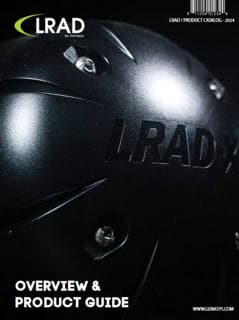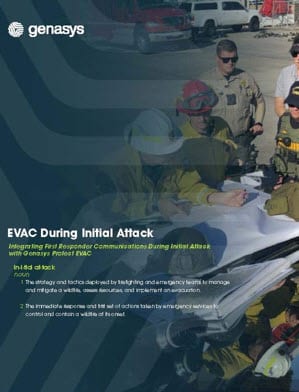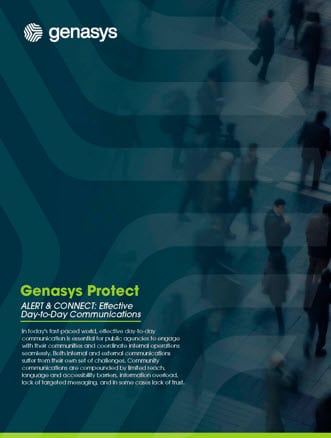This Code of Business Conduct and Ethics (the “Code”) sets forth legal and ethical standards of conduct for directors, officers and employees of LRAD Corporation DBA Genasys Inc. (the “Company”). This Code is intended to deter wrongdoing and to promote the conduct of all Company business in accordance with high standards of integrity and in compliance with all applicable laws and regulations.
If you have any questions regarding this Code or its application to you in any situation, you should contact your supervisor or the Company’s Chief Executive Officer.
Compliance with Laws, Rules and Regulations
The Company requires that all employees, officers and directors comply with all laws, rules and regulations applicable to the Company wherever it does business. You are expected to use good judgment and common sense in seeking to comply with all applicable laws, rules and regulations and to ask for advice when you are uncertain about them.
If you become aware of the violation of any law, rule or regulation by the Company, whether by its officers, employees, directors, or any third party doing business on behalf of the Company, it is your responsibility to promptly report the matter to your supervisor or to the Company’s Chief Executive Officer. While it is the Company’s desire to address matters internally, nothing in this Code should discourage you from reporting any illegal activity, including any violation of the securities laws, antitrust laws, environmental laws or any other federal, state or foreign law, rule or regulation, to the appropriate regulatory authority. Employees, officers and directors shall not discharge, demote, suspend, threaten, harass or in any other manner discriminate or retaliate against an employee because he or she reports any such violation, unless it is determined that the report was made with knowledge that it was false. This Code should not be construed to prohibit you from testifying, participating or otherwise assisting in any state or federal administrative, judicial or legislative proceeding or investigation.
Conflicts of Interest
Employees, officers and directors must act in the best interests of the Company. You must refrain from engaging in any activity or having a personal interest that presents a “conflict of interest.” A conflict of interest occurs when your personal interest interferes, or appears to interfere, with the interests of the Company. A conflict of interest can arise whenever you, as an officer, director or employee, take action or have an interest that prevents you from performing your Company duties and responsibilities honestly, objectively and effectively.
Employees and officers must not:
- Perform services as a consultant, employee, officer, director, advisor or in any other capacity, or permit any close relative to perform services as an officer or director, for a significant customer, significant supplier or direct competitor of the Company, other than at the request of the Company;
- Have, or permit any close relative to have, a financial interest in a significant supplier or significant customer of the Company, other than an investment representing less than one percent (1%) of the outstanding shares of a publicly held company or less than five percent (5%) of the outstanding shares of a privately-held company;
- Have, or permit any close relative to have, a financial interest in a direct competitor of the Company, other than an investment representing less than one percent (1%) of the outstanding shares of a publicly-held company;
- Supervise, review or influence the job evaluation or compensation of a member of his or her immediate family; or
Engage in any other activity or have any other interest that the Board of Directors of the Company determines to constitute a conflict of interest.
Directors must not:
- Perform services as a consultant, employee, officer, director, advisor or in any other capacity, or permit any close relative to perform services as an officer or director, for a direct competitor of the Company;
- Have, or permit any close relative to have, a financial interest in a direct competitor of the Company, other than an investment representing less than one percent (1%) of the outstanding shares of a publicly-held company;
- Use his or her position with the Company to influence any decision of the Company relating to a contract or transaction with a supplier or customer of the Company if the director or a close relative of the director:
- Performs services as a consultant, employee, officer, director, advisor or in any other capacity for such supplier or customer; or
- Has a financial interest in such supplier or customer, other than an investment representing less than one percent (1%) of the outstanding shares of a publicly-held company.
- Supervise, review or influence the job evaluation or compensation of a member of his or her immediate family; or
- Engage in any other activity or have any other interest that the Board of Directors of the Company determines to constitute a conflict of interest.
A “close relative” means a spouse, dependent child or any other person living in the same home with the employee, officer or director. “Immediate family” means a close relative and a parent, sibling, child, mother- or father-in-law, son- or daughter-in-law or brother- or sister-in law. A “significant customer” is a customer that has made during the Company’s last full fiscal year, or proposes to make during the Company’s current fiscal year, payments to the Company for property or services in excess of one percent (1%) of (i) the Company’s consolidated gross revenues for its last full fiscal year or (ii) the customer’s consolidated gross revenues for its last full fiscal year. A “significant supplier” is a supplier to which the Company has made during the Company’s last full fiscal year, or proposed to make during the Company’s current fiscal year, payments for property or services in excess of one percent (1%) of (i) the Company’s consolidated gross revenues for its last full fiscal year or (ii) the customer’s consolidated gross revenues for its last full fiscal year.
It is your responsibility to disclose any material transaction or relationship that reasonably could be expected to give rise to a conflict of interest to the Chief Executive Officer or, if you are an executive officer or director, to the Board of Directors, who shall be responsible for determining whether such transaction or relationship constitutes a conflict of interest.
Insider Trading
Employees, officers and directors who have material non-public information about the Company or other companies, including our suppliers and customers, as a result of their relationship with the Company are prohibited by law and Company policy from trading in securities of the Company or such other companies, as well as from communicating such information to others who might trade on the basis of that information. To help ensure that you do not engage in prohibited insider trading and avoid even the appearance of an improper transaction, the Company has adopted an Insider Trading Policy, which is distributed to all employees, consultants, officers and directors.
If you are uncertain about the constraints on your purchase or sale of any Company securities or the securities of any other company that you are familiar with by virtue of your relationship with the Company, you should consult with the Company’s Chief Financial Officer before making any such purchase or sale.
Confidentiality
Employees, officers and directors who have material non-public information about the Company or other companies, including our suppliers and customers, as a result of their relationship with the Company are prohibited by law and Company policy from trading in securities of the Company or such other companies, as well as from communicating such information to others who might trade on the basis of that information. To help ensure that you do not engage in prohibited insider trading and avoid even the appearance of an improper transaction, the Company has adopted an Insider Trading Policy, which is distributed to all employees, consultants, officers and directors.
Third parties may ask you for information concerning the Company. Subject to the exceptions noted in the preceding paragraphs, employees, officers and directors (other than the Company’s authorized spokespersons) must not discuss internal Company matters with, or disseminate internal Company information to, anyone outside the Company, except as required in the performance of their Company duties and after an appropriate confidentiality agreement is in place. This prohibition applies particularly to inquiries concerning the Company from the media, market professionals (such as securities analysts, institutional investors, investment advisors, brokers and dealers) and security holders. All responses to inquiries on behalf of the Company must be made only by the Company’s authorized spokespersons. If you receive any inquiries of this nature, you must decline to comment and refer the inquirer to your supervisor or one of the Company’s authorized spokespersons. The Company’s policies with respect to public disclosure of internal matters are described more fully in the Company’s Communications and Disclosure Policy, which is distributed to all employees, consultants, officers and directors.
You also must abide by any lawful obligations that you have to your former employer. These obligations may include restrictions on the use and disclosure of confidential information, restriction on the solicitation of former colleagues to work at the Company and non-competition obligations.
Honest and Ethical Conduct and Fair Dealing
Employees, officers and directors should seek to protect the Company’s assets. Theft, carelessness and waste have a direct impact on the Company’s financial performance. Employees, officers and directors must use the Company’s assets and services solely for legitimate business purposes of the Company and not for any personal benefit or the personal benefit of anyone else.
Employees, officers and directors must advance the Company’s legitimate interests when the opportunity to do so arises. You must not take for yourself personal opportunities that are discovered through your position with the Company or the use of property or information of the Company.
Gifts and Gratuities
The use of Company funds or assets for gifts, gratuities or other favors to employees or government officials is prohibited, except to the extent such gifts are in compliance with applicable law, insignificant in amount and not given in consideration or expectation of any action by the recipient.
Employees, officers and directors must not accept, or permit any member of his or her immediate family to accept, any gifts, gratuities or other favors from any customer, supplier or other person doing or seeking to do business with the Company, other than items of insignificant value. Any gifts that are not of insignificant value should be returned immediately and reported to your supervisor. If immediate return is not practical, they should be given to the Company for charitable disposition or such other disposition as the Company, in its sole discretion, believes appropriate.
Common sense and moderation should prevail in business entertainment engaged in on behalf of the Company. Employees, officers and directors should provide, or accept, business entertainment to or from anyone doing business with the Company only if the entertainment is infrequent, modest and intended to serve legitimate business goals.
Bribes and kickbacks are criminal acts, strictly prohibited by law. You must not offer, give, solicit or receive any form of bribe or kickback anywhere in the world.
Accuracy of Books and Records and Public Reports
Employees, officers and directors must honestly and accurately report all business transactions. You are responsible for the accuracy of your records and reports. Accurate information is essential to the Company’s ability to meet legal and regulatory obligations.
All Company books, records and accounts shall be maintained in accordance with all applicable regulations and standards and accurately reflect the true nature of the transactions they record. The financial statements of the Company shall conform to generally accepted accounting rules and the Company’s accounting policies. No undisclosed or unrecorded account or fund shall be established for any purpose. No false or misleading entries shall be made in the Company’s books or records for any reason, and no disbursement of corporate funds or other corporate property shall be made without adequate supporting documentation.
It is the policy of the Company to provide full, fair, accurate, timely and understandable disclosure in reports and documents filed with, or submitted to, the Securities and Exchange Commission and in other public communications.
Concerns Regarding Accounting or Auditing Matters
Employees with concerns regarding questionable accounting or auditing matters or complaints regarding accounting, internal accounting controls or auditing matters may confidentially, and anonymously if they wish, submit such concerns or complaints in writing to the Company’s Chief Financial Officer, c/o LRAD Corporation, 16990 Goldentop Road, Suite A, San Diego, California 92127 or contact directly at 858-676-0515. See “Reporting and Compliance Procedures.” All such concerns and complaints will be forwarded to the Audit Committee of the Board of Directors, unless they are determined to be without merit by the Chief Financial Officer of the Company. In any event, a record of all complaints and concerns received will be provided to the Audit Committee each fiscal quarter. Any such concerns or complaints may also be communicated, confidentially and, if you desire, anonymously, directly to the Chairman of the Audit Committee, by writing to the Chairman of the Audit Committee, c/o LRAD Corporation, 16990 Goldentop Road, Suite A, San Diego, California 92127.
The Audit Committee will evaluate the merits of any concerns or complaints received by it and authorize such follow-up actions, if any, as it deems necessary or appropriate to address the substance of the concern or complaint.
The Company will not discipline, discriminate against or retaliate against any employee who reports a complaint or concern, unless it is determined that the report was made with knowledge that it was false.
Dealings with Independent Auditors
No employee, officer or director shall, directly or indirectly, make or cause to be made a materially false or misleading statement to an accountant in connection with (or omit to state, or cause another person to omit to state, any material fact necessary in order to make state statements made, in light of the circumstances under which such statements were made, not misleading to, an accountant in connection with) any audit, review or examination of the Company’s financial statements or the preparation or filing of any document or report with the SEC. No employee, officer or director shall, directly or indirectly, take any action to coerce, manipulate, mislead or fraudulently influence any independent public or certified public accountant engaged in the performance of an audit or review of the Company’s financial statement.
Waivers of this Code of Business Conduct and Ethics
While some of the policies contained in this Code must be strictly adhered to and no exceptions can be allowed, in other cases exceptions may be possible. Any employee or officer who believes that an exception to any of these policies is appropriate in his or her case should first contact his or her immediate supervisor. If the supervisor agrees that an exception is appropriate, the approval of the Company’s Chief Executive Officer must be obtained. The Chief Executive Officer shall be responsible for maintaining a record of all requests for exceptions to any of these policies and the disposition of such requests.
Any executive officer or director who seeks an exception to any of these policies should contact the Company’s Chief Executive Officer. Any waiver of this Code for executive officers or directors or any change to this Code that applies to executive officers or directors may be made only by the Board of Directors of the Company and will be disclosed as required by law or stock market regulations.
Reporting and Compliance Procedures
Every employee, officer and director has the responsibility to ask questions, seek guidance, report suspected violations and express concerns regarding compliance with this Code. Any employee, officer or director who knows or believes that any other employee or representative of the Company has engaged or is engaging in Company-related conduct that violates applicable law or this Code should report such information to his or her supervisor or to the Company’s Chief Executive Officer, as described below. You may report such conduct openly or anonymously without fear of retaliation. The Company will not discipline, discriminate against or retaliate against any employee who reports such conduct, unless it is determined that the report was made with knowledge that it was false, or who cooperates in any investigation or inquiry regarding such conduct. Any supervisor who receives a report of a violation of this Code must immediately inform the Company’s Chief Executive Officer.
You may report violations of this Code, on a confidential or anonymous basis, by contacting the Company’s Chief Executive Officer by fax, mail or e-mail at: 858-676-1112; 16262 West Bernardo Drive, San Diego, CA 92127. While we prefer that you identify yourself when reporting violations so that we may follow up with you, as necessary, for additional information, you may leave messages anonymously if you wish.
If the Company’s Chief Executive Officer receives information regarding an alleged violation of this Code, he or she shall, as appropriate, (a) evaluate such information, (b) if the alleged violation involves an executive officer or a director, inform the Board of Directors of the alleged violation, (c) determine whether it is necessary to conduct an informal inquiry or a formal investigation and, of so, initiate such inquiry or investigation and (d) if the alleged violation involves an executive officer or a director, report the results of any such inquiry or investigation, together with a recommendation as to the disposition of the matter, to the Board of Directors or a committee thereof. Employees, officers, and directors are expected to cooperate fully with any inquiry or investigation by the Company regarding an alleged violation of this Code. Failure to cooperate with any such inquiry or investigation may result in disciplinary action, up to and including discharge.
The Company shall determine whether violations of this Code have occurred and, if so, shall determine the disciplinary measures to be taken against any employee who has violated this Code. In the event that the alleged violation involves an executive officer or a director, the Chief Executive Officer and the Board of Directors, respectively, shall determine whether a violation of this Code has occurred and, if so, shall determine the disciplinary measures to be taken against such executive officer or director.
Failure to comply with the standards outlined in this Code will result in disciplinary action including, but not limited to, reprimands, warnings, probation or suspension without pay, demotions, reductions in salary, discharge and restitution. Certain violations of this Code may require the Company to refer the matter to the appropriate governmental or regulatory authorities for investigation or prosecution. Moreover, any supervisor who directs or approves of any conduct in violation of this Code, or who has knowledge of such conduct and does not immediately report it, also will be subject to disciplinary action, up to and including discharge.
Dissemination and Amendment
This Code shall be distributed to each new employee, officer and director of the Company upon commencement of his or her employment or other relationship with the Company and shall also be distributed annually to each employee, officer and director of the Company, and each employee, officer and director shall certify that he or she has received, read and understood the Code and has complied with its terms.
The Company reserves the right to amend, alter or terminate this Code at any time for any reason. The most current version of this Code can be obtained from the Company’s Chief Financial Officer.
This document is not an employment contract between the Company and any of its employees, officers or directors.
Certification
I,
____________________________________________________________________(Print Name Above)
, do hereby certify that:
- I have received and carefully read the Code of Business Conduct and Ethics of Genasys, Inc.
- I understand the Code of Business Conduct and Ethics.
- I have complied and will continue to comply with the terms of the Code of Business Conduct and Ethics.
Date: ______________________
Signature: _______________________________________________
EACH EMPLOYEE, OFFICER AND DIRECTOR IS REQUIRED TO SIGN, DATE AND RETURN THIS CERTIFICATION TO THE HUMAN RESOURCES DEPARTMENT WITHIN 30 DAYS OF ISSUANCE. FAILURE TO DO SO MAY RESULT IN DISCIPLINARY ACTION.





